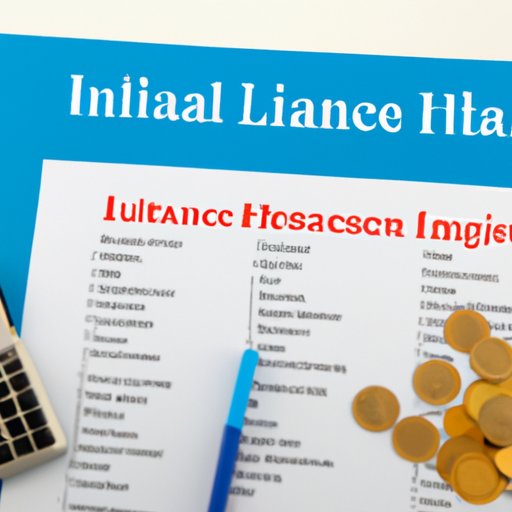
Explaining the Basics of Health Insurance Deductibles
When shopping for health insurance, you may come across the term “deductible” and wonder what it means. Deductibles are an important part of any health insurance plan and can have a significant impact on your overall coverage. Understanding what a deductible is, how it works, and how to choose the right one for your needs can help you make informed decisions when selecting a health insurance plan.
Definition of a Deductible
A health insurance deductible is the amount of money you must pay out-of-pocket before your health insurance plan begins covering medical expenses. In other words, you will be responsible for paying the full cost of any medical services up to the amount of your deductible before your health insurance kicks in. Once you have met your deductible, your health insurance will cover a portion or all of the remaining costs of your medical care.
How Deductibles Work
Deductibles vary from plan to plan and can range from $0 to thousands of dollars. Generally, the higher the deductible, the lower your monthly premium payments will be. However, if you need to use your health insurance, you will be responsible for paying the full amount of your deductible before your insurance coverage kicks in. For example, if you have a $1,000 deductible and require medical care that costs $2,000, you will need to pay the first $1,000 out-of-pocket. Your health insurance company then pays the remaining $1,000.
Examples of Deductibles
Deductibles can also vary depending on the type of service you are receiving. For example, some plans may have separate deductibles for prescription drugs, hospital stays, and doctor visits. Additionally, some plans may have an annual deductible, which means that you must pay all of your medical expenses up to the deductible amount each year before your insurance will kick in. Other plans may have a per-service deductible, meaning that you must pay a certain amount for each service you receive before your insurance will cover the costs.
How to Choose a Deductible for Your Health Insurance Plan
Choosing the right deductible for your health insurance plan is an important decision. It’s important to consider your financial situation and health needs when deciding on a deductible. Here are some factors to consider when choosing a deductible:
Factors to Consider When Choosing a Deductible
- Your current financial situation and budget.
- Your expected health care costs.
- Your ability to pay a large lump sum up front if necessary.
- Your risk tolerance and comfort level with taking on more financial responsibility.
Calculating Your Maximum Out-of-Pocket Cost
It’s important to consider your maximum out-of-pocket cost when choosing a deductible. This is the total amount you would be required to pay out-of-pocket in a given year, including your deductible, coinsurance, and copayments. Knowing this amount can help you determine which deductible is most appropriate for you.
A Guide to Managing Out-of-Pocket Costs with Deductibles
Managing out-of-pocket costs can be a challenge, especially if you have a high deductible. Here are some strategies to help reduce costs:
Strategies to Help Reduce Costs
- Look for discounts. Many providers offer discounts for cash payments or for paying in full at the time of service.
- Compare prices. Shop around for the best prices on medical services.
- Negotiate bills. If possible, try negotiating with your provider to reduce your bill.
- Take advantage of preventive care. Many preventive services such as immunizations and screenings are covered by insurance with no out-of-pocket cost.
Ways to Save Money on Healthcare Services
- Choose generic medications. Generic medications are typically less expensive than brand name drugs.
- Use mail order pharmacies. Many health insurance plans offer discounts for purchasing medications through mail order pharmacies.
- Opt for lower-cost treatments. Ask your doctor if there are lower-cost treatments available for your condition.
- Take advantage of free or low-cost services. Many hospitals and clinics offer free or low-cost health care services.

The Pros and Cons of High Deductible Health Insurance Plans
High deductible health insurance plans can be a good option for those who don’t anticipate needing much medical care. These plans typically have lower monthly premiums, but they require you to pay a larger amount out-of-pocket before your insurance kicks in. Here are the advantages and disadvantages of high deductible health insurance plans.
Advantages of High Deductibles
- Lower monthly premiums.
- You may qualify for a health savings account (HSA).
- You may be more likely to shop around for the best prices on medical services.
Disadvantages of High Deductibles
- You may be responsible for paying thousands of dollars out-of-pocket before your insurance kicks in.
- You may not be able to afford necessary medical care due to the high deductible.
- You may be more likely to postpone or avoid getting medical care due to the high cost.
Understanding How Deductibles Affect Your Premiums
The amount of your deductible can have a big impact on your monthly premium payments. Generally, the higher the deductible, the lower your premiums will be. However, it’s important to consider your financial situation and expected health care costs when choosing a deductible. Here are some factors that influence premium prices:
Impact of Deductibles on Premiums
- The type of plan you choose.
- The amount of your deductible.
- Your age, location, and family size.
- Whether you use tobacco.

Comparing Deductible Options to Find the Right Fit for Your Needs
When shopping for health insurance, it’s important to compare different plans to find the right fit for your needs. Different plans offer different types of deductibles, so it’s important to understand the different options available. Here’s a guide to comparing different plans:
Types of Deductibles Available
- Annual deductible – You must pay the full amount of your deductible each year before your insurance coverage kicks in.
- Per-service deductible – You must pay a certain amount for each service you receive before your insurance will cover the costs.
- Combined deductible – This is a combination of an annual deductible and a per-service deductible. The combined deductible must be met before your insurance will cover any of your medical expenses.
How to Compare Different Plans
- Understand the types of deductibles available.
- Compare the maximum out-of-pocket costs for each plan.
- Check the coverage for each plan to make sure it meets your needs.
- Compare the monthly premiums for each plan.
Evaluating Your Options
Once you have compared the different plans, it’s important to evaluate your options. Consider your financial situation, expected health care costs, and risk tolerance when making your decision. Also, remember to factor in the cost of your monthly premiums and out-of-pocket costs when evaluating your options.
Making the Final Decision
Once you have evaluated your options, it’s time to make the final decision. Consider all of the factors discussed above and make sure the plan you choose meets your needs. It’s also important to compare quotes from different insurers to make sure you are getting the best deal.
Conclusion
Understanding what a health insurance deductible is, how it works, and how to choose the right one for your needs can help you make informed decisions when selecting a health insurance plan. Comparing different plans and understanding the different types of deductibles available can help you make the best decision for your needs.
(Note: Is this article not meeting your expectations? Do you have knowledge or insights to share? Unlock new opportunities and expand your reach by joining our authors team. Click Registration to join us and share your expertise with our readers.)
